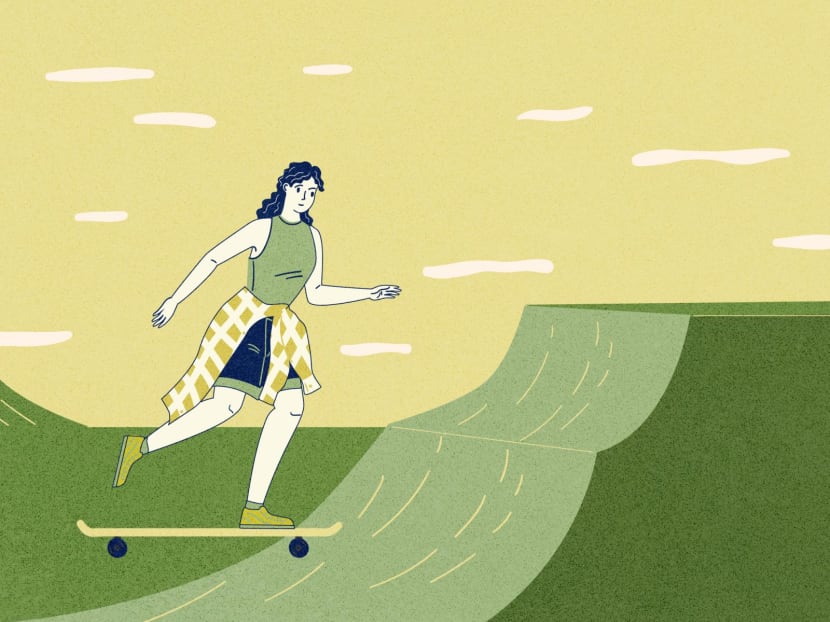The art of finding joy in a hobby that I'm awful at
Everyone's a beginner when starting out in a new hobby. But is it okay to be mediocre at it?

(Illustration: CNA/Samuel Woo)

This audio is generated by an AI tool.
Adulthood is not just one phase of life but comes in stages. Its many facets can be overwhelming, from managing finances and buying a home to achieving work-life balance and maintaining healthy relationships. In this series, CNA TODAY's journalists help readers deal with the many challenges of being an adult and learn something themselves in the process.
The other day, I felt a pang of guilt when I looked at my pair of climbing shoes gathering dust in the corner of my room, untouched for months.
For a time, I had fallen in love with the sport of bouldering, which is a form of rock climbing, after my friends introduced me to it four years ago.
I was hooked to the adrenaline rush of reaching the top, after deciphering the best route to get there, and doing so in the company of like-minded friends.
But for some reason, I felt myself plateauing in the sport because I could not get past a certain “climbing grade”, a marker that indicates the technical difficulty of a particular route on the climbing wall.
No one starts out as a professional, my friends would tell me, adding that I will get better over time with practice.
So I did. I invested in my own gear, purchased passes to climbing gyms and tried to climb weekly to better myself.
But I just never felt good enough at the sport. There was always a wall too high and too steep for me to climb.
As soon as I accepted my own mediocrity in bouldering, my motivation to continue disappeared.
I don’t think I was being too harsh on myself and beating myself up over failures. Rather, the mere knowledge that I wasn’t a natural talent sucked my enjoyment in the sport and I gradually stopped climbing.
Some time later, this all happened to me again after another friend asked if I wanted to pick up skateboarding with her. I readily agreed because it seemed like a fun way to keep active.
Yet again, I was unable to progress to a level I was happy to be skating at and soon, I found myself prioritising the hobby less.
My skateboard now occupies a different corner of my home, also gathering dust.
Looking back at my pathetic attempts to maintain my hobbies over the past year, I wondered if my head was wired to peg enjoyment to accomplishment.
It’s not as though karaoke enthusiasts are necessarily good singers, gardeners never kill any plants, and home cooks always whip up delicious meals. Why couldn’t I just have fun while being awful at it?Â
To find out, I spoke to experts to find out where this pressure was coming from and how I can rediscover that spark of joy that got me into the hobby in the first place.
TO EXCEL OR TO HAVE FUN
Several psychologists I interviewed said that it is natural for people to seek excellence in something that they enjoy and have spent some time doing.
Ms Sara-Ann Lee, a clinical psychologist at The Psychology Practice, said that people might get into hobbies for the sake of leisure at first, but this might change when these pursuits become a more major part of their lives.
For instance, they might develop social ties or connections with others while picking up the hobby. This adds an element of social support, group pressure and recognition into the mix, so it is not just about their own needs and desires any more.
Hearing this from Ms Lee made me reflect on my experiences. I didn’t mind failure if I was still making progress overall, but as I plateaued, I began to feel increasingly like the incompetent one in my group.
It’s embarrassing to be a terrible climber and it is a worse feeling to see them get better while I get left behind.
On this, Ms Lee added that societal norms play a definitive role in shaping our views of achievement, success and competition.
“It’s not uncommon that individuals may come to endorse a binary view of either being successful or not, and this can shape self identity,” she added.
This is especially prevalent in the Singapore context, another psychologist said.
Dr Jonathan Marshall, who is also an executive coach, explained that children here may be programmed from a young age to see the pursuit of co-curricular activities in relation to entry requirements for schools and universities, and such mindsets may inevitably lend itself to their approach to hobbies later on.
As people grow, they may develop core fears or insecurities that are left unaddressed, he added. This causes people to try to compensate for these anxieties in the things that they do, whether at work or in their hobbies.
HOW TO FIND THE RIGHT BALANCE
Dr Joel Yang, director and clinical psychologist in private practice at Mind What Matters, said that when we are good at something, it “reinforces our strengths and helps contribute to adding flow to our lives”.
This “flow” refers to a mental state in which a person in an activity is fully present and “immersed in a feeling of energised focus and full involvement in the activity”, he added.Â
However, he cautioned against letting one’s pursuit of success become the main reason to pursue the hobby.
“When you start to fixate on results over the enjoyment of the process, it is a sign that it may not be benefitting you by its original intention,” Dr Yang said.
When this happens, it could be useful to take a short break or time off from that activity.
The experts I spoke to offered other suggestions that I found helpful to reshape my expectations from the hobby.
For a start, while engaging in the hobby, remember why you chose to pursue it in the first place – whether it was to maintain an active lifestyle or simply for the joy of learning something new.
With this in mind, consider setting goals that are more process-oriented rather than outcome-focused.
After all, setting goals is not bad in and of itself. It can be useful for tracking one’s progress and can be motivational as well, as long as we don’t go overboard with our expectations.
For instance, people can reframe their progress goals by setting immediate and short-term aims that encourage more participation in the hobby, rather than having goals that are focused on winning or achieving.
What struck me most from listening to the experts was that I had set myself up to fulfil unreasonable expectations without realising it.
I had let outcomes dictate my interest in bouldering, forgetting that my climbing grade is just an indication of my abilities in the sport and nothing more.
It is as Dr Yang said: “Achievement is not an end goal, but rather a continual marker of improvement.”
So now, I have been trying to revisit the reasons why I’d started bouldering a few years ago and try to put on my climbing shoes again. If I hit a wall in my progress, it just means there is more to learn and love in this sport.
The old proverb “if at first you don’t succeed, try again” still rings true, but with a little tweak – it’s because success isn’t the only way to find joy.
After all, I don’t have to be an Olympic gold medallist to love a good climb.













